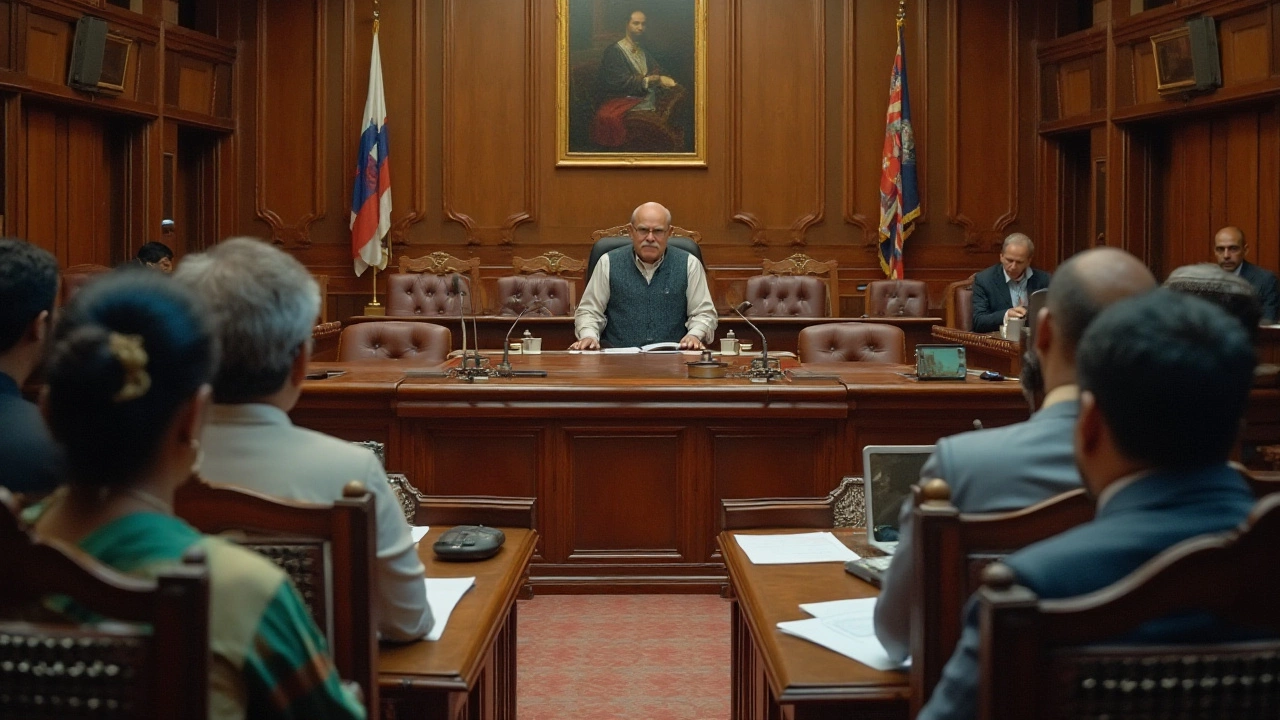When it comes to the topic of property rights and landlord access, Maryland has specific regulations that every landlord and tenant should be aware of. These laws are designed to balance the rights of tenants to enjoy privacy and the needs of landlords to maintain their properties. While property ownership might imply certain rights and freedoms, it definitely does not mean a landlord can enter their rental property at will.
Learning about tenant rights and what situations necessitate landlord access can prevent misunderstandings and legal issues. Whether you own property in Maryland or rent one, knowing these rules can protect you from unnecessary conflicts. Keep reading to discover how the laws play out in real-world scenarios and what steps both landlords and tenants can take to ensure compliance.
- Legal Guidelines for Entry
- Tenant's Right to Privacy
- Scenarios Requiring Permission
- Emergencies and Exceptions
- Consequences of Unlawful Entry
- Tips for Landlords and Tenants
Legal Guidelines for Entry
In the lively legal landscape of Maryland, the interaction between landlords and tenants is framed by precise rules that relate directly to property access. At the heart of these guidelines is the protection of a tenant's right to privacy, a cornerstone principle supported by state laws that emphasize fairness and respect. Landlords must acknowledge that owning a property does not grant limitless access, and strict legal protocols need to be followed. Most notably, landlords are typically required to give a 24-hour notice before entering a rental property, unless an emergency situation arises. This notice period is designed to ensure tenants feel secure and respected within their homes.
Understanding the circumstances under which a landlord can enter a property without explicit permission involves recognizing specific scenarios outlined by Maryland law. Routine inspections, necessary repairs, and property showings in case of sale or future renting are commonplace reasons that might necessitate entry. However, these should never be conducted capriciously, and proper tenant communication remains crucial. Notably, the law often stipulates that such entries occur during reasonable hours, typically standard business times. Landlords who ignore these stipulations might find themselves entangled in disputes, potentially resulting in legal actions brought by tenants.
Legal exceptions exist, primarily hinging on emergency situations. In cases such as a fire, or urgent structural repairs that could lead to property damage or safety issues, landlords might act without the routine notice. Still, it is essential to understand that emergencies should not be a pretext for habitual intrusions. Reliable documentation and subsequent communication with tenants post-emergency are best practices, fostering trust and exonerating landlords from accusations of overreach. As a precautionary measure, landlords are encouraged to record any such events, detailing the nature of the emergency and actions taken.
"Understanding these legal guidelines isn't just beneficial—it's essential," remarks Emily Johnson, a Maryland-based attorney specializing in property law. "For tenants, knowing your rights is key to ensuring these are protected. For landlords, it is about maintaining professionalism and avoiding legal pitfalls."
To visualize the intricacies of lawful entry, consider this illustrative table of common scenarios requiring landlord access in Maryland:
| Reason for Entry | Notice Required | Legal Parameters |
|---|---|---|
| Routine Maintenance | 24-hour notice | Typically during business hours |
| Property Inspection | 24-hour notice | Advanced tenant notification |
| Emergency Repairs | No notice | Post-entry communication required |
By adhering to these established protocols, landlords in Maryland not only uphold the law but also contribute to a harmonious landlord-tenant relationship. Clarity in communication and mutual respect build a foundation for successful rental agreements, ultimately benefiting both parties involved in the property leasing process.
Tenant's Right to Privacy
In Maryland, the tenant's right to privacy is a fundamental principle that stands at the core of the landlord-tenant relationship. This right is not just a courtesy afforded to tenants, but a legal entitlement enshrined in state laws. These laws are designed to ensure that tenants can enjoy their homes without undue interference. A tenant’s home is their personal space, and the expectation is that they can use it without their activities being constantly monitored or interrupted. The laws in Maryland explicitly require landlords to respect this by limiting their access to the property to specific situations.
The crux of tenant privacy rights lies in the requirement of providing 'reasonable notice' before any landlord entry, which typically translates to at least 24 hours. This time frame allows the tenant to prepare for such visits, ensuring that their personal affairs are not unduly disrupted. The tenant's schedule and preferences should be considered, as the home is ultimately theirs for the duration of the lease. Different situations call for different approaches, but the key is always clear, honest communication between landlord and tenant.
Legal Protections and Exceptions
The specificity of these requirements highlights the importance of mutual respect in the landlord-tenant relationship. Maryland law assumes the default position that a tenant’s home is private property not to be intruded upon without significant reason. Even in cases of inspections or necessary repairs, the purpose of the visit does not negate the tenant’s rights. Emergencies, such as a burst pipe or fire threatening the unit, are generally the only exception where a landlord can enter without prior notice.Aside from legal mandates, common decency also plays a role. Tenants expect and deserve a degree of trust when it comes to their living space. A landlord's failure to adhere to these guidelines could result in legal consequences, and damage to the landlord-tenant relationship which is pivotal for long-term tenancy success. A good practice is to keep lines of communication open at all times, reducing misunderstandings about access rights and responsibilities.
"The essence of a harmonious tenancy lies in understanding and respecting mutual boundaries." - Rental Housing Advocate
Addressing the issue of unlawful entry is vital. Tenants who feel their rights have been infringed upon can seek redress through local housing authorities or legal avenues. Sometimes, the mere knowledge that a landlord knows and respects these boundaries is enough to foster trust and better living conditions. It is prudent for both parties to document all occurrences of landlord entry, maintaining a record of notifications and agreements about access times.

Scenarios Requiring Permission
In Maryland, certain scenarios mandate landlords to seek permission from tenants before entering a property. It's paramount for landlords to respect the tenant rights stipulated in rental agreements and state laws. Typically, an understanding is reached during the lease signing, where both parties agree on terms of access. For instance, landlords often need entry for routine maintenance. Imagine a leaky faucet or a busted water heater – these need fixing without delay or they could escalate into more significant issues. That said, even in such situations, landlords should usually provide notice in advance, stating the specific reasons and times for the inspection or repair work.
Another common reason landlords need to enter is to show the property to potential new tenants or buyers. These showings are crucial for both maintaining an uninterrupted rental income and for a smooth property sale. It's common practice to arrange these visits at convenient times for the current tenant, requiring at least 24 hours' notice to ensure both parties are adequately prepared. This extends to situations where improvements or renovations are necessary, which might require longer and more involved access.
As legal expert Jeffrey Smith notes, "The key is clear and timely communication. Conflicts often arise not out of the action itself but from an unexpected disruption to the tenant's life."When it comes to inspections for safety compliance or pest control, a respectful advance notice should still be part of the landlord’s agenda. In Maryland, gaining the trust of tenants through transparent processes and grounded discussions can make all the difference in harmonizing these entry requirements.
On the flip side, failure to adhere to these protocols might have repercussions. Tenants might seek legal recourse, leading to fines or even disputes that damage the landlord's reputation. Always remember, respecting tenant rights isn't just about abiding by the law, it's also about fostering a healthy and trusting relationship. Violating these boundaries can lead to claims of unlawful entry, a topic landlords are eager to avoid. Even in emergencies, clear communication post-entry is essential. Protecting privacy while ensuring necessary property management may seem like a complex dance, but with the right steps, it's more than achievable.
Emergencies and Exceptions
When considering situations that might prompt a landlord to access a property without a tenant's permission in Maryland, the term "emergencies" holds a weighty legal and practical meaning. In the event of a true emergency, landlords are typically allowed to enter the tenant's premises without prior consent to prevent damage or injury. Events like bursting pipes, fires, or gas leaks categorize as emergencies given their potential to cause immediate harm. These scenarios not only threaten the property itself but also the health and safety of any occupants, making swift action absolutely necessary.
It's important to define what qualifies as an emergency to avoid ambiguity. According to Maryland law, an emergency is any unforeseen situation that demands immediate response to mitigate damages. For instance, if there's a water leak that risks flooding an apartment, delaying could translate into costly damages for both the tenant and landlord. In these instances, ethical and legal standards align in encouraging landlords to act without procrastination.
However, the term "exceptions" can be equally significant in shaping the interaction between landlord and tenant over property access. Besides emergencies, there are other exceptional situations where entry might be warranted. Scheduled maintenance or inspections, often detailed in the lease agreement, might fall under this category if they're critical and previously agreed upon. Landlords should consciously work to keep tenants informed about anticipated entry, stating the purpose and timing clearly. This prevents the misunderstanding and friction that might otherwise arise.
"A well-maintained property is beneficial for both landlords and tenants, and communication is key. Tenants will appreciate landlords who keep them in the loop," notes John Doe, a legal advisor at the Maryland Tenants' Council.
Landlord entry without tenant permission can sometimes lead to violations, too. Exceptions are not free passes for landlords to ignore boundaries. Even in cases of urgent repair when a landlord fears potential danger, it is still advisable to notify the tenant promptly after the fact. Documentation post-entry adds a layer of transparency, ensuring any misunderstanding is promptly cleared up.
Understanding the nuances of these exceptions and emergencies can foster a more harmonious relationship between tenant and landlord in Maryland. If everyone on both sides knows their rights and responsibilities, fewer disruptive incidents occur, making life easier for landlords managing their properties and tenants enjoying their leased homes. The laws are designed to be clear, ensuring that the balance tips towards security and respect for both parties involved. Knowing when a landlord can step inside your rented space is empowering for tenants, and likewise, recognizing legitimate access helps landlords maintain trust with those who lease their properties.

Consequences of Unlawful Entry
In the state of Maryland, tenant rights are staunchly protected to ensure they have a safe and private living environment. When a landlord breaches these rights by entering their rental property without permission, they expose themselves to various legal consequences that can be both financially and reputationally damaging. Such acts can yield negative effects not just for one instance but can also hamper a landlord's credibility over time.
One primary consequence is being held liable for trespassing. By law, tenants have exclusive possession of their rented property, which means landlords must adhere to proper notice requirements unless it's an emergency. Violating this norm can lead to legal actions being taken by the tenant. Once a case is brought to court, landlords may have to provide compensation for any damages incurred due to their unauthorized access, such as replacement costs for any broken locks or other security measures.
Another critical repercussion is the impact on tenant trust and satisfaction. If tenants feel their privacy is compromised, it could lead to premature termination of the lease agreement. Tenants tend to seek out landlords who respect their rights and offer them the peace of mind they deserve. An unwanted entry complaint could lead to lower occupancy rates and high tenant turnover, which can hurt a landlord's business operations significantly. Issues with high vacancy rates can also translate to a drop in rental income, affecting overall profitability.
Legal Ramifications and Tenant Actions
The legal protocols associated with unlawful entry set a stringent standard for landlord behavior. Tenants might feel empowered to pursue legal relief under the jurisdiction's rental laws, potentially filing for a temporary injunction or seeking damages for any invasion of privacy or emotional distress incurred. This adds a layer of complexity for landlords, as handling legal matters can be both time-consuming and costly. As a form of direct action, tenants might opt to withhold rent until the issue is resolved, placing additional financial strain on the landlord.
Justice Douglas once noted, "The right to be let alone is indeed the beginning of all freedoms." This underpins why property access regulations are so rigorously enforced in Maryland.
Moreover, repeated unlawful entries may tarnish a landlord's reputation, especially in today’s digital age where online reviews and tenant forums can broadcast these issues widely, affecting future rental prospects. It's paramount for landlords to gain awareness and follow state-specific rules to foster a cooperative and trusting relationship with their tenants. By doing so, they avoid unnecessary legal battles and preserve harmony within their rental properties, preventing any loss related to rental income or brand reputation.
Tips for Landlords and Tenants
Navigating the legal landscape of tenant rights and landlord entry rules can be daunting, but with a few tips, both parties can maintain a harmonious relationship in Maryland. For landlords, it's paramount to respect the tenant's right to privacy. Not only does this foster trust, but it's also a legal requirement. Informing tenants ahead of time about any planned visits or inspections, typically 24 hours in advance, is both courteous and often necessary by law. It's advisable to communicate this via written notice, ensuring there's a record of the communication just in case there's ever a dispute.
From the tenant's perspective, understanding when your landlord has the legal right to access your rented home is crucial. While emergencies such as leaks or fire hazards might require immediate entry without notice, these instances are exceptions rather than the norm. If your rights as a tenant feel encroached upon, it's beneficial to have a conversation with your landlord first. As reinforced by the Maryland Landlords Association, "open communication can often dispel misunderstandings and build better rapport." This approach not only potentially resolves issues faster but may also prevent legal action.
Both parties can greatly benefit from establishing open channels of communication. Regular check-ins, whether through email or face-to-face meetings, create a space for both landlords and tenants to express concerns or suggest improvements. During these communications, it’s important for landlords to be upfront about any scheduled maintenance or property checks. Landlords should also ensure they have the tenant's updated contact information, which aids in notifying tenants of any emergencies or necessary property visits. Tenants should feel free to raise any concerns about privacy or comfort, knowing it’s within their rights to do so. These conversations can often prevent minor issues from escalating into bigger legal or relational problems.
An excellent practice for landlords is to document all interactions related to property access. This might include emailing written notices to tenants and saving any correspondences that discuss a change in access or maintenance schedules. Having a paper trail can be a significant advantage if any disputes arise. Tenants should keep a record as well, noting any unauthorized entries or instances where notice wasn’t properly given. This helps build a case should any legal issues develop, ensuring both parties have evidence to support their claims or defenses.
When landlords aim to gain access for repairs or showings, clarity is key. Provide the tenant with detailed reasons for the access request, specifying dates, times, and the nature of the visit. This not only aligns with Maryland state law requirements but also helps tenants feel more comfortable about the process. Similarly, tenants should respond promptly to such requests, voicing any concerns or suggestions for alternative times if they exist. This give-and-take establishes a respectful partnership where both parties feel acknowledged and valued.
It’s worth noting that failure to adhere to these laws and courteous practices can lead to legal consequences. Landlords could face penalties, and tenants might seek legal recompense, which can be costly and time-consuming. Therefore, having a good grasp of the relevant Maryland rental laws is just as essential as understanding one's own rights and responsibilities. Both parties should strive to be proactive about educating themselves on these legal nuances. A commitment to following best practices ensures that the landlord-tenant relationship remains cordial and legally compliant.





